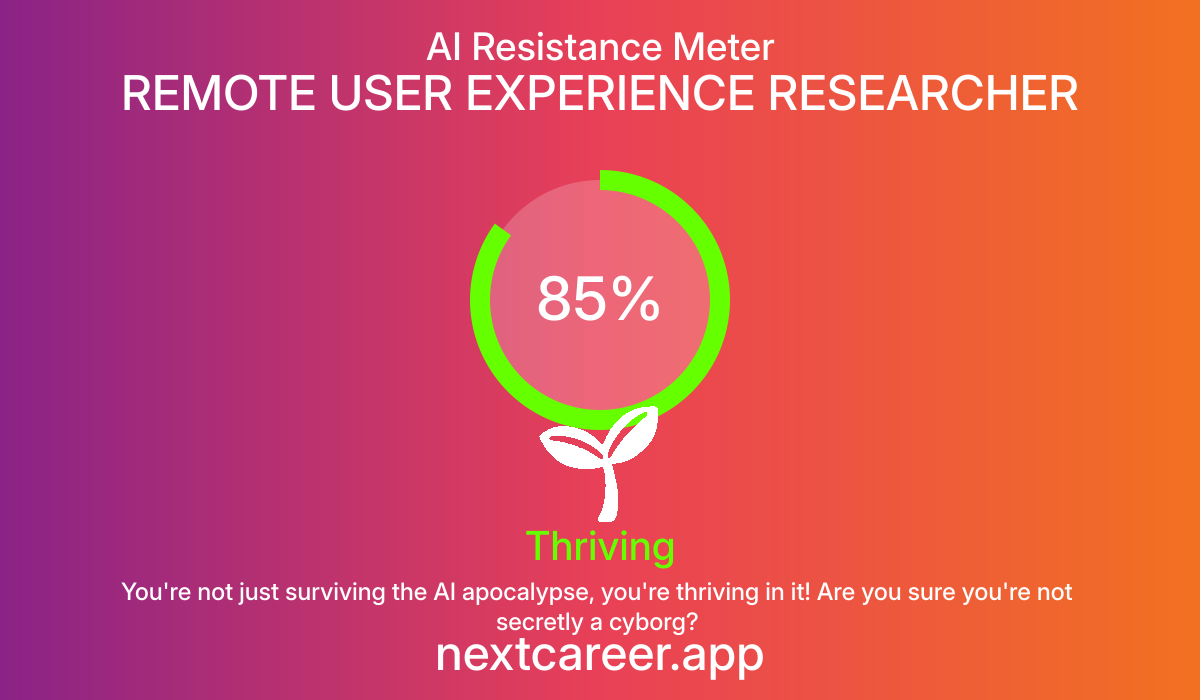AI Resistance for REMOTE USER EXPERIENCE RESEARCHER
AI Resistance Score
AI Resistance Meter
Thriving
REMOTE USER EXPERIENCE RESEARCHER
You're not just surviving the AI apocalypse, you're thriving in it! Are you sure you're not secretly a cyborg?
User Experience (UX) Researchers are tasked with understanding user needs, behaviors, and experiences to inform the design of intuitive, user-friendly products. While AI can assist in data collection and analysis processes, the nuanced understanding of human behavior, cultural context, and empathy-driven insights remain hard for AI to fully replicate. Over the next 5 years, AI will increasingly handle quantitative tasks like data pattern recognition and automated survey analysis. However, the synthesis of qualitative insights, especially those involving emotional intelligence and cultural nuances, will continue to rely on human expertise. Looking 20+ years into the future, while AI tools will be integral to the UX research process, human-AI collaboration rather than replacement is expected, as creative, empathetic, and complex problem-solving skills will remain critical.
User Experience (UX) Researchers are tasked with understanding user needs, behaviors, and experiences to inform the design of intuitive, user-friendly products. While AI can assist in data collection and analysis processes, the nuanced understanding of human behavior, cultural context, and empathy-driven insights remain hard for AI to fully replicate. Over the next 5 years, AI will increasingly handle quantitative tasks like data pattern recognition and automated survey analysis. However, the synthesis of qualitative insights, especially those involving emotional intelligence and cultural nuances, will continue to rely on human expertise. Looking 20+ years into the future, while AI tools will be integral to the UX research process, human-AI collaboration rather than replacement is expected, as creative, empathetic, and complex problem-solving skills will remain critical.
Key Factors
- Cognitive Tasks: AI can process large volumes of data quickly, but interpreting nuanced human reactions and deriving insights requires human judgment.
- Emotional Intelligence: Understanding and empathizing with users is difficult for AI, particularly in diverse and complex scenarios.
- Physical Skills: Being a remote role, physical skills are less relevant; the challenge lies more in virtual presence and engagement.
- Creative Thinking: Developing innovative research methodologies and interpreting multifaceted human needs involve creativity beyond algorithmic approaches.
Human Advantages
- Interpretation of qualitative data
- Empathy with users
- Creative problem-solving
- Cultural context understanding
AI Vulnerabilities
- Automated data analysis
- Pattern recognition in large datasets
- Basic survey administration
Recommended Actions
- Embrace AI tools for data analysis to increase efficiency.
- Develop interdisciplinary skills, combining UX research with fields like psychology and social sciences.
- Focus on honing skills in empathy and cultural understanding.
- Engage in continuous learning about emerging technologies to integrate with UX methodologies.
- Participate in shaping ethical guidelines for AI in UX research.
In the near term, UX researchers will benefit from AI tools that streamline data handling, freeing more time for strategic and creative tasks. Long-term, the integration of AI into the UX field will likely lead to advanced human-AI collaboration models where AI supports data-intensive processing and humans focus on relational and design-thinking components. Shifts in societal values may elevate the importance of creating inclusive and emotionally intelligent user experiences, strengthening the role of human researchers.
